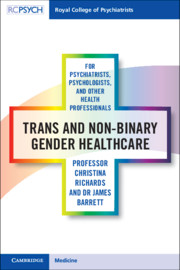Book contents
- Trans and Non-binary Gender Healthcare for Psychiatrists, Psychologists, and Other Health Professionals
- Reviews
- Trans and Non-binary Gender Healthcare for Psychiatrists, Psychologists, and Other Health Professionals
- Copyright page
- Contents
- Acknowledgements
- Author Biographies
- Chapter 1 Introduction to Gender Diversity
- Chapter 2 Assessment
- Chapter 3 Physical Treatments for Trans People and Their Interactions with Psychiatric Treatments
- Chapter 4 Mental Health Conditions
- Chapter 5 Supporting Trans and Non-binary People in Mental Health Services
- Chapter 6 Supporting Trans and Non-binary People in Forensic Settings
- Chapter 7 Autistic Spectrum Conditions and Intellectual Disability
- Chapter 8 Sexuality, Relationships, and Reproduction
- Chapter 9 Legal and Religious Aspects
- Chapter 10 Psychotherapy
- Index
- References
Chapter 6 - Supporting Trans and Non-binary People in Forensic Settings
Published online by Cambridge University Press: 18 August 2020
- Trans and Non-binary Gender Healthcare for Psychiatrists, Psychologists, and Other Health Professionals
- Reviews
- Trans and Non-binary Gender Healthcare for Psychiatrists, Psychologists, and Other Health Professionals
- Copyright page
- Contents
- Acknowledgements
- Author Biographies
- Chapter 1 Introduction to Gender Diversity
- Chapter 2 Assessment
- Chapter 3 Physical Treatments for Trans People and Their Interactions with Psychiatric Treatments
- Chapter 4 Mental Health Conditions
- Chapter 5 Supporting Trans and Non-binary People in Mental Health Services
- Chapter 6 Supporting Trans and Non-binary People in Forensic Settings
- Chapter 7 Autistic Spectrum Conditions and Intellectual Disability
- Chapter 8 Sexuality, Relationships, and Reproduction
- Chapter 9 Legal and Religious Aspects
- Chapter 10 Psychotherapy
- Index
- References
Summary
Criminal offending is not the norm and gender dysphoria is comparatively rare. The combination of the two, accordingly, is so infrequent that there is little published literature, and none of it even attempts statistical validity. In this specialised element of an already specialised field within a medical specialism, any learning must inevitably, perhaps, be experiential. Experience grows patient by patient, and knowledge and judgement correspondingly improve. It is for this reason that trans folk in forensic settings present the greatest challenges and require every ounce of multidisciplinary attention that can be afforded. This chapter does not specifically cover trans people in the secure estate who have an autistic condition or an intellectual disability (see Chapter 7, Autistic Spectrum Conditions and Intellectual Disability); however, the principles outlined here may apply also for those who have been diverted into the mental health system, or who are in the secure mental health estate as discussed later.
- Type
- Chapter
- Information
- Trans and Non-binary Gender Healthcare for Psychiatrists, Psychologists, and Other Health Professionals , pp. 61 - 69Publisher: Cambridge University PressPrint publication year: 2020
References
Further Reading
References
- 1
- Cited by

